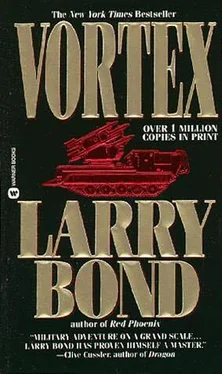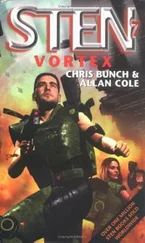Nicholson flipped the folder open and studied it carefully for a few moments.
“Our agents and monitoring stations in the Far East and northern
Pacific have noted significant increases in back-channel arms purchases.”
He arched an eyebrow at Forrester.
“Naturally, we’re always trying to track who sells and who buys what, but it’s a damned difficult task. Too many middlemen. Too much money. And too many foreign governments too willing to help the arms dealers keep a lid on their activities.”
Forrester nodded politely and motioned him onward.
“Both the North Koreans and Chinese have been making extra shipments of tanks, artillery, and surface-to-surface missiles-apparently in response to orders placed over the past several weeks. In and of itself, that’s not so unusual. Most of the weapons systems being sold are those Beijing and Pyongyang have sold in the past to regular customers like Iran.”
No surprise there. Both North Korea and China were cash poor and willing to sell weapons to anyone willing to pay.
Nicholson shrugged.
“Trouble is … we haven’t been able to spot the hardware arriving at any known transshipment point. ” He closed the folder and looked around the group.
“Now the equipment could simply still be in transit to a regular customer, or on hold in some third country until final transport can be arranged. “
“But there is a chance these tanks, guns, and missiles are going to Cuba or Angola?”
“It’s not impossible, Mr. Vice President,” Nicholson conceded.
Charming. Castro evidently wasn’t content to rely solely on
Soviet-supplied weapons. And by expanding his sources of supply, the
Cuban dictator was also reducing Moscow’s leverage over his actions in southern Africa.
Forrester turned to the lean, square-jawed man in the next chair over.
Hamilton Reid, the secretary of commerce, had the relaxed, confident air that often went with old money invested wisely.
“The President’s also concerned about the economic effects of this damned crisis.”
“And wisely so.” Reid didn’t need to kowtow and didn’t bother trying.
“Prices for key strategic minerals like titanium, chromium, platinum, and the others are showing a steady rise. It’s mostly psychological, so far.
South Africa’s production hasn’t been affected by the fighting in
Namibia. If anything, Pretoria’s actually selling more than it normally would to finance these arms deals the director told us about. But the financial community’s never been entirely rational.”
Several of the men and women around the table laughed softly. They’d all seen the studies suggesting that random dart throws did a better job of forecasting the stock market than any other system.
The secretary of commerce acknowledged their laughter with a slight smile of his own.
“We’ve been working closely with the other major trading nations-especially the British and the Japanese-to do what we can. We’ve all been leaning on our respective commodities exchanges in an effort to slow things down, Highlevel briefings to show there’s no immediate supply problem. Temporary market closings when prices rise too fast. That sort of thing.”
His smile dimmed.
“All with only moderate success. Right now, the commodities exchanges are capable of handling these higher minerals prices. That may not last. There’s a kind of critical mass to these situations.”
Forrester nodded his understanding. In the past month alone, the
Strategic Commodities Index had shot up more than 30 percent. If the prices for key strategic minerals started climbing any faster, they could trigger a wave of panic buying-a kind of feeding frenzy that might send prices soaring through the roof. Scaremongers were already touting the possibility of 300 or 400 percent price rises.
And that could spell disaster for the United States, Great Britain, and almost every other industrialized nation in the world. The minerals largely supplied by South Africa, a few of its neighbors, and the Soviet
Union were vital to a wide range of industries-steel, oil refining, chemicals, and electronics to name just a few. Dramatically higher minerals prices would mean significantly higher production costs for jet engines, gasoline, computers, consumer electronics, and thousands of other products. That, in turn, could send a flood tide of higher prices, lower sales, and lost jobs surging through the economy.
Forrester frowned. Most Americans didn’t realize it, but much of their nation’s prosperity depended on a steady flow of reasonably priced minerals from overseas. Some of the percentages spoke for themselves-98 percent of all manganese, 92 percent of all chromium, and 91 percent of all the platinum-group metals consumed by American industry were imported. All told, the U’S. was critically dependent on foreign suppliers for twenty-two of the thirty-odd minerals government planners viewed as essential for industrial and defense needs. And America’s allies weren’t in much better shape. Preliminary figures showed the nation’s trade deficit and inflation rate both starting to climb again.
Forrester looked up at the rest of the NSC and ran his eyes over a roomful of newly gloom-filled faces.
“Right. We’re in something of an economic box. But we’re not alone. That’s why I’ve asked Hamilton to have his staff prepare an analysis of South Africa’s own economic picture.”
Reid didn’t bother with papers or projectors.
“Put simply, South Africa’s economy cannot survive the current situation. Pretoria is caught between an increasingly expensive foreign war and a steadily less productive domestic economy. Many of the country’s white workers are now in uniform, and those few skilled black laborers who might have replaced them are either dead, in prison, or barred from filling them. Nothing short of complete peace can significantly alter the situation. “
The commerce secretary looked carefully from face to face.
“If conditions do not change, our analysis indicates we can expect a total South African economic collapse in less than a year. Even the harshest imaginable austerity measures can delay such a collapse by a year beyond that at most.”
The chairman of the Joint Chiefs of Staff, Air Force General Walter
Hickman, had been silent up to this point. As the commerce secretary paused, he broke in.
“I think that assessment may be a little extreme, Mr.
Vice President. I remember several predictions that Iran’s economy would completely collapse in the 1980s, during its war with Iraq. None of them came true. Massive inflation and unemployment, sure. But not total chaos.”
Reid showed no signs of being disturbed by Hickman’s disagreement.
“The difference, General, is that Iran’s population wholeheartedly supported the war with Iraq. Fanaticism can feed people for quite a while.” He shook his head slowly.
“But South Africa is much more divided-even the white community is split over Vorster’s racial policies and the Namibian war.
There is no one flag that everyone can rally around. “
Hurley pressed hint.
“What exactly do you mean by ‘collapse’?”
“Reduced production from the mines and factories, followed by food and fuel shortages. At first, those shortages will only affect the poorest, most vulnerable segments of South Africa’s population-the blacks, coloreds,
Indians, and other nonwhite ethnic groups. But the country’s whites won’t be immune for long. As things get steadily worse, anyone who can leave, will-draining South Africa of the skilled people most needed to keep its economy running. ” Reid looked suddenly grim.
“In the final stages, we could expect widespread violence and looting-with daily death tolls that would make what we’ve seen so far look like a picnic. And add this factor-there is no country willing to come to South Africa’s aid, no source of outside assistance to stop a headlong slide into chaos.”
Читать дальше












